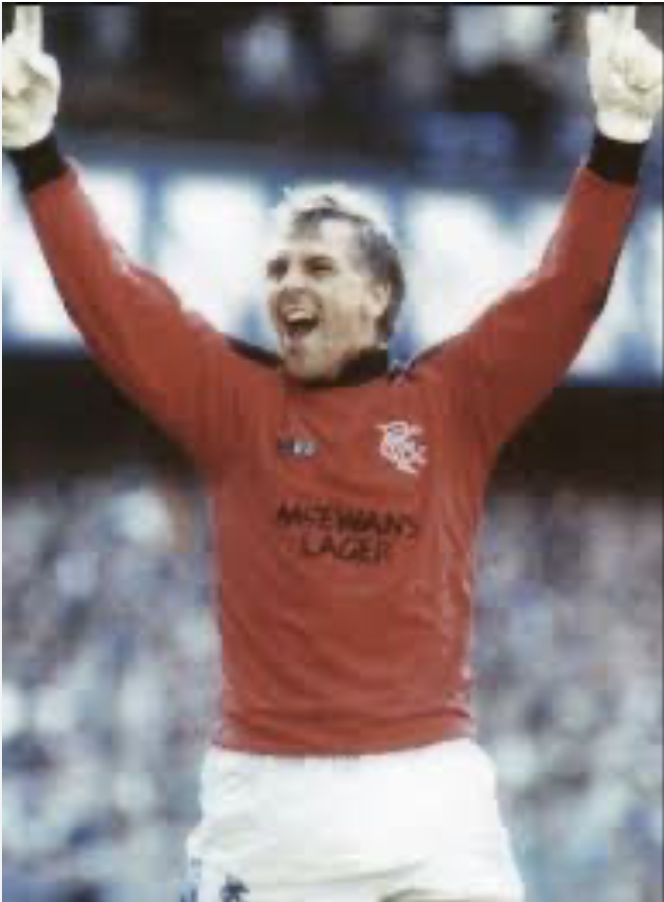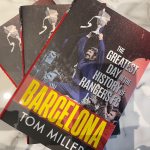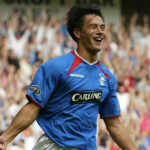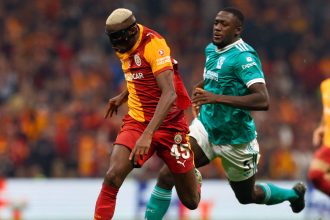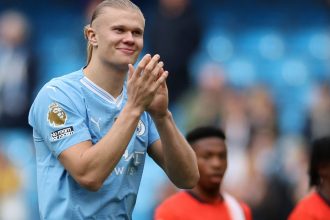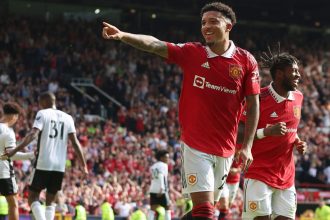By Alistair Aird
When Rangers announced the loan signing of Mikey Moore from Tottenham Hotspur on 1 August, excitement rippled through the Rangers support. Recognised as one of the most talented young players in the English Premier League, the procurement of a lad who won’t be 18 until 11 August was regarded as being something of a coup. Moore would slot in nicely to the jigsaw that Russel Martin was constructing in his attempt to revive, rebuild and revitalise Rangers. He may indeed be the final piece of said jigsaw.
Previous transfer business with Tottenham has also provided missing pieces in masterplans, none more so than in December 1986 when Rangers signed a player directly from Tottenham for the very first time………
Most Read on FollowFollow.com No change of Heart – Rangers 0 – 2 Hearts The Follow Follow Friday Preview – 22 August 2025 Dessers Departs – A look back at Cyriel
Graham Paul Roberts was born in Southampton on 3 July 1959. He was signed as a schoolboy by his local club in October 1973. But four years later, Roberts was released by The Saints, and he would suffer the same fate after a season with Portsmouth.
At this stage, Roberts elected to take a few steps down the football pyramid in a bid to relaunch his career. And when he signed for Dorchester Town, that’s exactly what happened. Roberts scored 33 goals in 79 appearances which earned him a £5,000 move to Weymouth. He excelled further in his time there, prompting Tottenham Hotspur to break the non-league transfer record when they spent £35,000 to bring Roberts to White Hart Lane.
Roberts would make his league debut for Tottenham on 4 October 1980 when he came on to replace Garth Crooks in a 3-2 win over Stoke City. Two further substitute appearances followed in November – draws against Wolverhampton Wanderers and Crystal Palace – and Roberts also came off the bench when Tottenham defeated Arsenal 1-0 in the fourth round of the League Cup.
Roberts was handed his first start wearing the number four jersey in a 2-1 defeat against Liverpool at Anfield on 6 December. Steve Archibald scored the Tottenham goal. And Roberts would remain in the starting XI for all but two of the league matches that remained in that 1980/81 season.
And his first full season at White Hart Lane ended with a silver lining. Now established in the first team, Roberts appeared in all nine FA Cup ties and had two teeth knocked out during the Final against Manchester City. That match ended 1-1 with Tottenham winning the replay by three goals to two.
In the seasons that followed, Roberts became a mainstay. He could play in either defence or midfield, and in season 1981/82, he missed only five of the 42 Division One games that Tottenham contested. He scored six league goals too, including a hat-trick against his hometown club, Southampton, at White Hart Lane on 20 March.
Roberts would add another FA Cup winners medal to his collection after another replayed Final. Queens Park Rangers were beaten on this occasion although a 3-1 defeat against Liverpool in the League Cup Final thwarted Tottenham’s attempts for a Cup double. And there would be heartache on the Continent too when Barcelona eliminated Tottenham for the European Cup Winners Cup at the semi-final stage.
Injury restricted Roberts to just two substitute appearances in the opening 16 Division One games in season 1982/83. But he would start 20 of the remaining 26 league matches and also earn his first two caps for England when he was selected to play against Northern Ireland at Windsor Park in Belfast and against Scotland at Wembley.
Season 1983/84 would prove to be the zenith of Roberts’s Tottenham career. He scored six goals in 35 league appearances and would net three more, including one in the second leg of the Final, as Tottenham won the UEFA Cup. The Roberts goal would be crucial too as it took the tie to extra time. And having been made captain for the night in the absence of the suspended Steve Perryman, Roberts played his part in the penalty shoot-out, netting the first of Tottenham’s penalties.
That would be the last piece of silverware Roberts would grip as a Tottenham player. Season 1984/85 saw Roberts play in 40 of the 42 league matches and he was part of the side that eliminated Liverpool from the League Cup too. But Liverpool would avenge that defeat in the fourth round of the FA Cup later in the season and Sunderland dashed hopes of League Cup success too. And the defence of the UEFA Cup ended at the quarter-final stage when Tottenham lost to Real Madrid.
Graham Roberts would play his 209th and final league game for Tottenham on 13 December 1986. Glenn Hoddle and a chap called Richard Gough scored the goals in a 2-1 win for the home side over Watford at White Hart Lane.
For Roberts it was time for a new challenge. After playing over 350 times for Tottenham, he was persuaded by Graeme Souness to swap North London for Govan. And as much as the summer signings of Butcher and Woods laid the foundations for success and got the wheels in motion, the recruitment of Roberts provided the cog that got them running smoothly.
Roberts made his debut on 27 December against Dundee United at Ibrox. He marked it with a crunching challenge on the United goalkeeper, Billy Thomson, that created an opening to allow Ally McCoist to score in a game Rangers won 2-0. And on his second Ibrox outing, he was strong and stoic at the heart of the defence alongside Butcher as Souness masterminded a 2-0 win over Celtic on 1 January.
Roberts would miss only two league matches following his debut against United. The first was a 0-0 draw against Aberdeen at Ibrox on 24 January – Roberts was suspended after being ordered off by Andrew Waddell in a 2-0 win over Hamilton Accies – and the second was a home win over Dundee in April when Roberts was once again serving a single match suspension.
The impact Roberts made on that Rangers team cannot be understated.
Prior to his arrival, Rangers had played 24 Premier Division matches, winning 15, drawing four and losing five. Forty-three goals were scored and 14 conceded. But in the 18 league matches that Roberts played in, Rangers won 15, drew two and lost only once, a 3-1 defeat at Parkhead in April. In those games, 40 goals were scored and only nine conceded.
The relationship Roberts formed in central defence with Terry Butcher, which was fortified further by an immaculate last line of defence in the shape of Chris Woods, was one of the major factors that led to Rangers annexing the title for the first time in nine years. The potent partnership that McCoist and Fleck struck up at the sharp end of the pitch undoubtedly played a part too, but that rock solid defence, which was aided by Stuart Munro who was a model of consistency at left back, was the bedrock of the title push from January onwards.
Season 1987/88 would see a Rangers squad seek to do something that their predecessors hadn’t done for almost a decade, namely retain the league title. And Roberts would be at the heart of that mission, taking on the captain’s armband when Terry Butcher broke his leg in November before Rangers’ title challenge and his own Rangers career crashed and burned.
But his season would have something of a false start. After featuring in all the pre-season fixtures, a suspension carried over from the previous season ruled Roberts out of the first two league games, a 1-1 draw at home to Dundee United and a 1-0 defeat against Hibernian at Easter Road.
When he did get himself back in the starting XI, he tasted defeat for only the third time in a Rangers jersey when the Light Blues lost 2-0 at Pittodrie. And a fortnight later, Rangers lost again, making it three defeats in the opening five league games. Graeme Souness was ordered off for the third time since arriving in Scotland as his side went down 1-0 against Celtic at Parkhead.
Roberts would enjoy a rather topsy turvy October. He missed the first two matches of the month – a 0-0 draw against Hearts and a 3-1 win over St Mirren – because of a stomach injury. That also ruled him out of the tremendous 2-0 win over Dynamo Kiev at Ibrox in the European Cup. But he was back in contention by the time Rangers welcomed Celtic to Ibrox on 17 October. It was a match that would cement Roberts’s place in Rangers folklore.
A fracas involving Frank McAvennie and Chris Woods lit the blue touch paper. Roberts and Butcher waded in and after order was restored, the referee, Jim Duncan, dismissed Woods and McAvennie and booked Butcher and Roberts.
These were the days before goalkeepers had a place on the subs bench, so an outfield player was required to take over the gloves from Woods. Roberts volunteered and by the end of the match he was conducting the Copland Choir as Rangers, having been reduced to nine men after Butcher was cautioned for a second time, fought back from 2-0 down to snatch a 2-2 draw.
Woods, Roberts, Butcher and McAvennie – dubbed ‘Goldilocks and the Three Bears’ – were subsequently charged with behaviour that was likely to cause a breach of the peace. Woods and Butcher were found ‘guilty’, McAvennie ‘not guilty’ and Roberts ‘not proven’.
Eight days later, with Butcher suspended, Roberts was made captain for the League Cup Final against Aberdeen at Hampden. And by the end of an epic encounter, he was cupping his hands around the two trophies, Rangers winning 5-3 on penalties after the sides had shared six goals over 120 minutes. And Roberts had a hand in one of those goals too.
Going into the closing minutes, Rangers trailed by three goals to two. But when an attacking foray was snuffed out by a desperate Dons defence, Jimmy Nicholl lofted the ball back towards the danger area. Roberts bulldozed his way in and his header found Durrant who teed up Fleck to equalise.
Roberts missed the last match of the month – a 4-1 win over Dunfermline at East End Park – through injury, but after that he didn’t miss another first team game until injury ruled him out of a 1-1 draw against Hibernian at Ibrox on 16 April. In that run of games, he donned the gloves again against Celtic, having to do so on this occasion when Woods picked up a rib injury. He was made captain too, taking over from Butcher after his fellow Englishman had broken his leg against Aberdeen in November.
But just two weeks after that draw against Hibernian, Roberts played for Rangers for the last time.
In the penultimate league game of the season, Rangers lost 1-0 against Aberdeen at Ibrox. Souness felt Roberts was responsible for the concession of the goal. After the game, he said as much, and Roberts is said to have refuted what his manager said. In such a situation, there was only going to be one winner.
The following Saturday, Roberts was dropped for the match against Falkirk at Brockville. But he decided to turn up and watch the game among the Rangers supporters who chanted ‘Robbo Must Stay’. It didn’t work. When the Rangers Newswas released a few days later, Souness took to the front page to provide clarity:
Due to the reaction of the supporters, it is necessary for me to make the situation clear. After a game it is every manager’s right to express his opinion and every player’s duty to accept what the manager has to say. Graham Roberts took exception to remarks I made after the recent 1-0 defeat by Aberdeen at Ibrox. His response to my remarks was, among other comments, that he asked to be transferred from Rangers Football Club.
After making 82 appearances and scoring four goals, the Rangers career of Graham Roberts was over. Souness was true to his word and Roberts never played for the club again. In the ultimate humiliation, he was sent to the Highlands with the reserves ahead of season 1988/89. And when Rangers faced Fort William in the second match of the tour, Roberts was one of five substitutes named. Four of them – John Morrow, Steven Dunn, Shaun Rouse and Nigel Howard – were given minutes. Roberts was not called upon.
The point of no return had long since been passed. Roberts was eventually transferred to Chelsea, making his debut against Blackburn Rovers at Stamford Bridge on 27 August 1988. Meanwhile, some 407.2 miles further north, Rangers were hammering Celtic by five goals to one.
Roberts joined a Chelsea side that had just been relegated from Division One. For younger readers, this was the top division in England until the advent of the Premier League/Premiership in season 1992/93. But the presence of Roberts was one of the reasons that Chelsea bounced straight back up. He was soon appointed captain and Roberts was an ever-present as Chelsea romped to the title, finishing 17 points ahead of runners-up, Manchester City. Fifteen of Chelsea’s 96 league goals were netted by Roberts, 12 of them from the penalty spot.
Roberts would make 24 Division One appearances for Chelsea in season 1989/90. But he fell foul of the chairman, Ken Bates, and made his last appearance for the club in February 1990, scoring in a 1-1 draw against Brian Clough’s Nottingham Forest.
Roberts left The Bridge in November 1990, signing for West Bromwich Albion. Thereafter, he played for Stevenage Borough, Yeovil Town, Chesham United and Slough Town. He also had stints as manager at Enfield, Yeovil, Chesham, Hertford Town, Boreham Wood, Carshalton Athletic, Braintree Town, and Clyde. And it was while he was in charge of Clyde that he ingratiated himself with the Rangers supporters once again.
In season 2005/06, his Clyde side were drawn against his old club in the League Cup. And the Bully Wee came within 16 minutes of eliminating Rangers too. They led 2-1 before Thomas Buffel scored to draw the teams level at 2-2. And in extra time, a Marvin Andrews goal was sandwiched by a double from an Argentinian forward called Federico Nieto scored twice.
But it would be in the Scottish Cup that Roberts would secure the finest moment of his managerial career.
Clyde drew Celtic at home in the Third Round, the tie hyped up further by the fact that Roy Keane was making his Celtic debut after his move from Manchester United. But goals from Bryson and Malone and a disastrous performance from a Chinese defender called Du Wei saw Clyde win 2-1.
Thus, the story of Graham Roberts’s time as a Rangers player is one laced with triumphs, trials and tribulations. Let’s hope Mikey Moore’s time with us, however brief, leans more towards the first of those scenarios.
